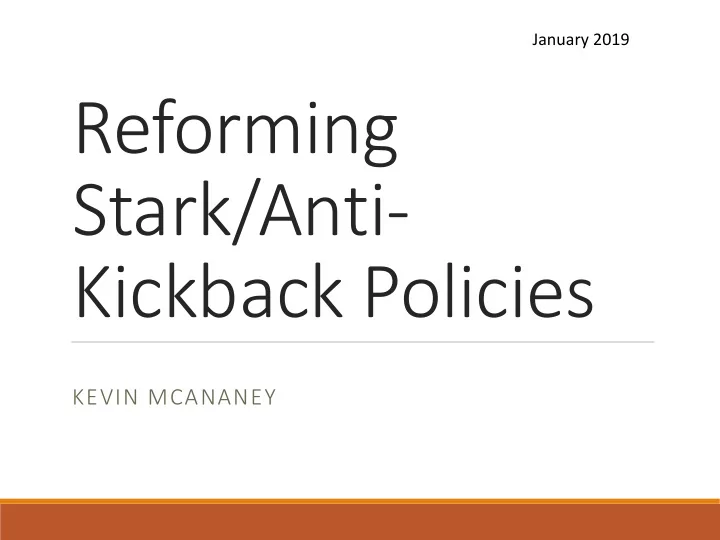

January 2019 Reforming Stark/Anti- Kickback Policies KEVIN MCANANEY
The Stark Law 42 USC §1395nn Prohibits physicians from referring M/M patients to hospitals and other entities for hospital and other services if the physician has a financial relationship with the entity UNLESS there is an exception for the financial relationship Intended to prohibit financial arrangements that incentivized physicians to refer Stark is a payment regulation and CMS has wide authority to implement 2
Stark Law Virtually all Stark exceptions require that compensation paid to a physician be: ◦ Fair market value for work performed or items given ◦ The compensation cannot vary with or take into account referrals from the physician 3
The Problem with Stark and Value-based Payments Value-based payment methodologies rely on keeping referrals in a network of providers committed to cost-effective, coordinated, and high quality care Payments for reducing unnecessary or duplicative care “take into account” the value of the referral The fair market value of a particular physician’s contribution is difficult Any investment by health system in the network (e.g., software, care coordinators) that benefits physicians must be paid at FMV Any financial relationship triggers the statute, so it affects wholly commercial arrangements 4
The Anti-Kickback Statute 42 USC §1320a-7b(b) Broadly prohibits persons from offering, paying, soliciting, or receiving anything of value in exchange for, or to induce, the referral of federal health care program patients or business Unlike Stark, AKS is a criminal statute ◦ DOJ has the ultimate say over any changes, including any safe harbor ◦ DOJ is generally risk averse 5
Problem of AKS and Value- based Payments Like Stark, value-based payments depend heavily on keeping patients in a network ◦ By definition, participants are being paid for referrals Any investments in network will give something of value to physicians that will likely benefit all of a physician’s including M/M fee for service Even if VBP is for commercial, government is concerned the arrangement will also influence physician referral patterns for M/M fee for service patients 6
Enforcement Is In the Hands of Whistleblowers Health care claims in violation of either Stark or AKS are considered false claims Any person can initiate a lawsuit in the name of the United States and get 15% to 30% of any recovery Any alleged Stark or AKS violation based on a value based payment methodology is likely to affect many physicians and many claims FCA damages are three times the amount of the claims AND a mandatory penalty of $15,000 per claim NO HEALTH SYSTEM CAN TAKE THAT RISK 7
Recommend
More recommend